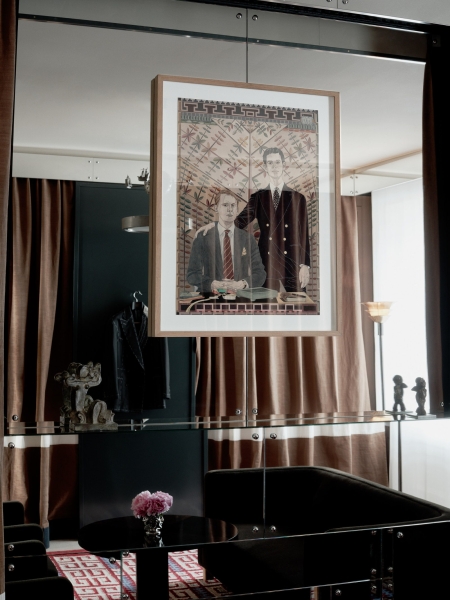“There is a reason why there isn’t really any clothing in here,” grins Saman Amel, one half of the Swedish tailoring label that bears his name, as he surveys the sexily plush first room of the brand’s new London atelier on Albemarle Street, Mayfair. “We want to start off with conversation,” he says. In fact, the only piece of clothing is a black suit jacket festooned in myriad white stitches that underlines the fact that Amel and his best friend and business partner Dag Granath specialize predominantly in the custom made.
Granath elaborates: “when a customer comes in and directly they see clothes, it does just feel transactional.” Such a crass introduction has no place at Saman Amel, where building relationships and understanding a client’s broader lifestyle is part of a philosophy based around the forging of a lifelong sartorial exchange. “If you don’t rush the first meeting the likelihood of building a relationship with that person over a longer time is so much higher,” explains Granath. Are they offering men a refuge from all the fashion noise out there? Yes! They both reply in unison. “As we saw our business really pick up, that was exactly what people were saying to us,” Granath adds.
They’ve literally leaned into this idea. Their new space, which was designed with interior architects Halleroed, who also worked on their Stockholm outpost, is two floors up from street level. Upon entering you are immediately enveloped in a cocoon of chocolate brown Italian raw silk covering the walls—dark brown being a key tone in their clothing design—alongside three-tone drapes and a deep chocolate velvet couch above which hangs a Swedish Grace-era ceiling lamp by Björn Ivar Trägårdh.
It’s not all chicly polite though—there’s a gregariously gorgeous, colorful painting by Trude Viken that they are both in love with for its contrast with their gloriously discrete clothes—which are peacefully arrayed for their clients’ eventual consideration in a second adjoining room featuring more objets d’art and a hanging artwork, “Singing Chef Suit,” by Lap See Lam, an artist they dressed at this year’s Venice Biennale.
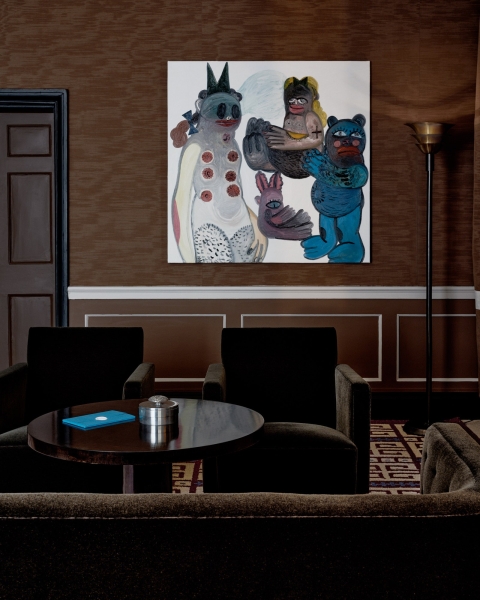
The label’s official birthdate is 2015, though the pair set up the company as years earlier as teenagers, selling handmade ties from their hometown of Vallentuna, on the outskirts of Stockholm, where their interest in fashion was mostly considered strange. Amel studied at The Academy for Cutting and Pattern Making in Stockholm; Granath has a BA in economics from Stockholm University. “When we were 12 or 13, Saman was already very articulate that he wanted to do clothes—couture-level women’s—and have a house, like Dior or Balenciaga,” recounts Granath. But while at school, he switched to menswear, and looked to Giorgio Armani and Ralph Lauren for inspiration.
Around 2012 on trips to Pitti Uomo in Florence, their ties and accessories started to garner attention—and after stints at J Lindeberg and learning everything they could, they began to make their own suits. “It is still Dag and I who own the business,” says Amel, proudly. “We haven’t taken in any external investments. We have tried to keep it super tight, so we can control the narrative, control the product, and not do things too hastily.”
In 2018, to give clients “food for thought” they introduced Curated Looks, which is around 25 styled foundational outfits, and the closest they get to traditional seasons, though these are not sold as ready-to-wear. Think of them more like a library of possibilities, from shape and cut, through fabric and color palette. “It’s a way to let customers imagine versions of these pieces that might work for their wardrobes,” says Amel. Everything starts from fabric—they’re developing their own which is a key part of their long-term strategy. “We are not working in specific drops or thinking about what we need to develop for the next season. We sample things only when we think we have something really worth doing and then that is field tested,” says Amel of the design process. “Sometimes, we don’t have anything new other than fabrics,” Granath adds. “It’s not so much about finding new things that are exciting, but more about identifying what we feel is the best version of something.”
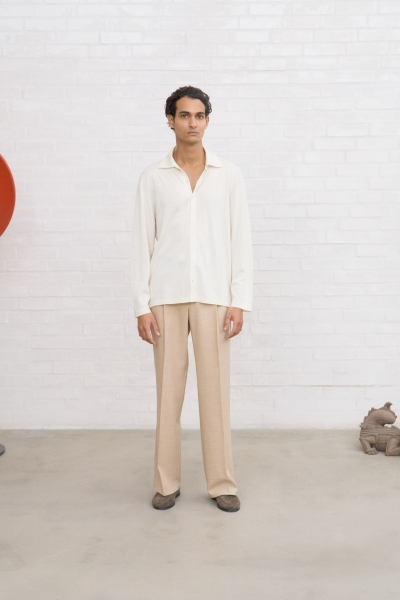
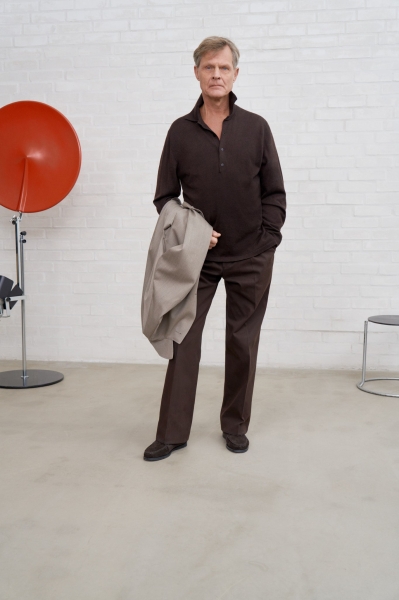
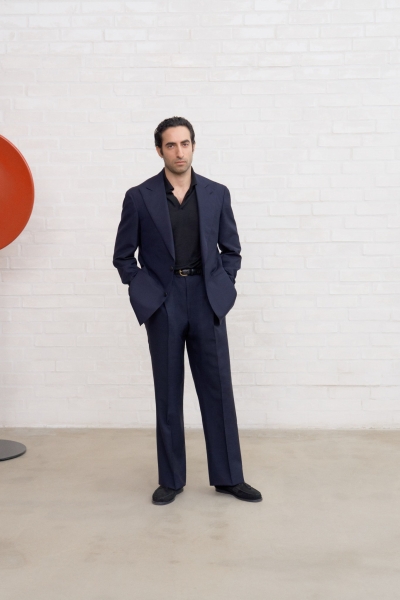
The pair acknowledge a certain Scandinavian austerity in terms of ornamentation and detailing, and a color palette that is mostly muted. They add elements to their designs reluctantly and with much consideration, but there’s a lot of softness and fluidity to their work, which makes it appealing. “The way the fabric drapes on the body will be key and that translates into the silhouette. It is also about adding volume in the right spaces,” says Granath. “We do fitted things, but as soon as something feels too tight or feels like it’s hugging too much, it will never really be our world.”
Despite Savile Row’s proximity, Amel and Granath have established a strong creative clientele in the London, mostly via trunk shows. “What we’ve been seeing over the past two years is that there is a group of individuals that don’t really feel they can connect with the traditional makers,” says Granath. “We are also seeing a lot of people coming to us instead of going to the mega brands,” adds Amel.
Do they look at runways? “Yes, a lot of womenswear actually, for silhouette and materials. It’s good to get an understanding of where the world is moving, the shifts in the industry,” says Amel. “I still reference a lot of old Phoebe Philo-era Celine, because the pattern cutting was so good. We had a customer bring in a pair of fantastic trousers from that period and I wanted to rip them apart just to understand them.” That said, they both believe that there’s a shift toward labels such as theirs whose emphasis on expertise and craft can often feel missing at splashier conglomerate-owned brands.
What have they learned about dressing people since they started? “The most beautiful thing about working with custom is there are so many routes. We also respect that you cannot force ideas, you have to adjust what you do to make it work for the individual,” says Granath. And how far can a customer push outside the lines? “We’re not afraid of saying ‘no, let’s look at something else,’ out of respect for ourselves and the customer,” explains Amel. “That said, we would never want to make them feel like a fool because they are proposing something we don’t think is good. We are not here to alienate them from their own ideas, but to guide them.”
Saman Amel is now open at 17 Albemarle Street, London W1.
